Some Tylerites embrace two seemingly contradictory identities: gay and Christian. Embracing both titles often comes at a cost.
Members of Tyler’s LGBTQ community who also deeply value their Christian faith recount internal battles, fallings-out with family members and difficulties with church leaders and congregants.
The following interviews reflect a wide range of LGBTQ members’ experiences in their Christian faith. Some grew up in East Texas churches and later pivoted to more accepting congregations, including the Episcopal Church. Others discovered their faith long after they had established their LGBTQ identities.
In every case, interviewees struggled but found support through mentors and allies who rallied to encourage their sexual and gender orientations alongside their faith.
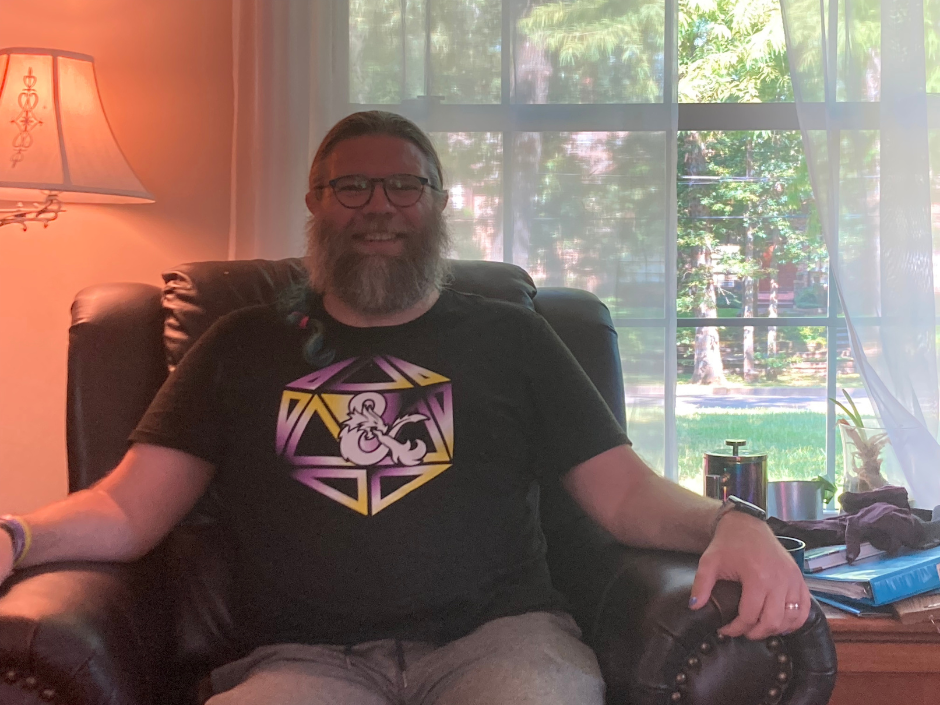
“I’m somewhere in the middle.”
Dust Hennigan is a 40-something non-binary person living in Tyler the past 12 years. Hennigan uses they/them pronouns and said they were raised “Southern Baptist atheist.”
“We had all of the judgment and none of the grace,” they said. Hennigan’s family did not attend church, but they spent summers in Odessa, Texas, with their grandfather, a Baptist pastor.
During their college years, Hennigan leaned toward atheism, but as an adult, slowly came back into their Christian faith, joining Presbyterian, evangelical and Episcopal denominations.
Hennigan said church activities can be challenging for non-binary Christians. “I always felt this sense of pretending to belong in a men’s group in a way that I have never experienced in a group that was mixed gender or a group that was women only, plus me. It makes church complicated now … because the groups get so gendered,” they said.
Although Christian for most of their adult life, Hennigan embraced a non-binary identity about three years ago. “I did a lot of reading online about the non-binary community and watched a lot of TikTok,” they said.
“I do not fit neatly into a box of ‘man’ or ‘woman.’ I fit into a box that is a blend of those two things. If there’s a spectrum, I’m somewhere in the middle.”
Although Hennigan knew their identity as non-binary might be problematic for some Christians, they didn’t consider leaving their faith, nor their congregation, Christ Episcopal Church South.
“The tradition, the practices — they just speak deeply to me. They make me feel connected to the divine. I feel like a part of a community, and I feel supported.”
Hennigan helped organize an outreach group for LGBTQ adults called Friends of St. Joan. The group meets to pray, fellowship and have discussions.
Hennigan concedes LGBTQ issues at their church can be tough and messy.
“I think it’d be nice if we had a priest who would perform gay marriage. We have three priests, and not one of them would perform a marriage right now,” they said.
Hennigan predicts continued rapid change in Christian churches.
“A lot of churches are going to have to get really cool with queer people … if they want to keep their doors open.”
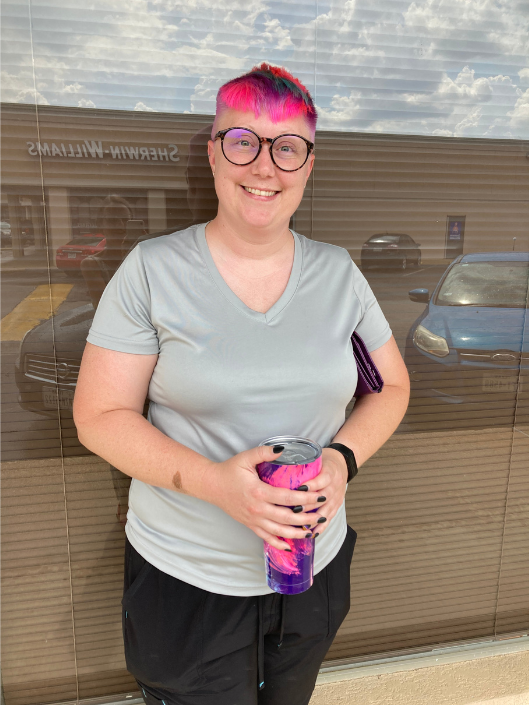
“They may accept, but they don’t affirm.”
Alesha Scott, a bisexual student in her early 30s studying biology, moved to Tyler in 2020. Scott found CrossPointe, a non-denominational church in Flint, and began attending.
“I was wanting to be part of the praise team, so I let that be known,” Scott said. Soon after, she heard members of the praise team would need to sign a contract declaring they are not LGBTQ. “That just started turning me off. I’d have to denounce more of myself, and I’m not willing to do that again,” she said.
Scott said she was attracted to CrossPointe because they said they accepted everyone. “They may accept, but they don’t affirm. They don’t want someone who’s queer to be up there,” she said.
Scott eventually found a church home at St. Clare’s Episcopal Church. “Church is not necessarily where I find my spirituality and my connection with God. It’s where I find community with other like-minded individuals … that I can get strength from to help me in my personal life,” Scott said.
Scott said she knew she was bisexual since her early 20s. Part of the struggle has been living with people who disapprove.
“I have people in my family who think being transgender is wrong. They think the transgender person is saying that God made a mistake.”
For Scott, finding a safe community has been a part of the antidote, and she recommends Christians find a community to give them strength.
Scott wishes people knew that watching movies and reading books featuring LGBTQ people does not change a person’s sexual orientation. “It’s not gonna turn your child gay. Gay people watched thousands and thousands of Disney movies where there’s many a heterosexual, and they still turned out gay.”
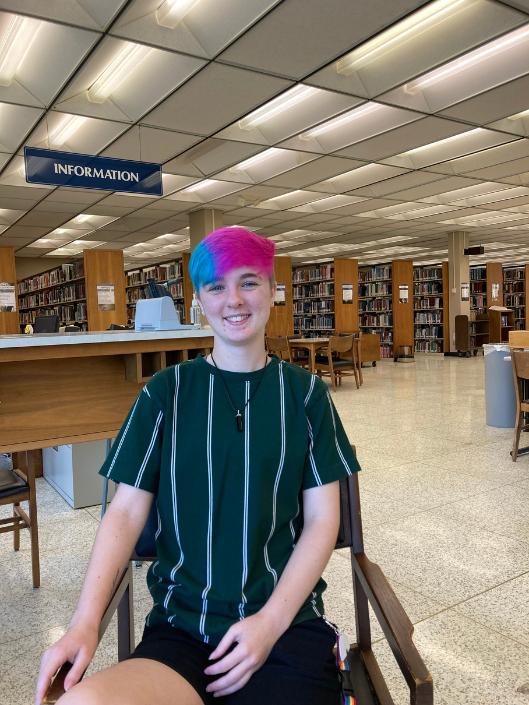
“I realize that I can still be loved by God and also be gay.”
Indigo Penn is a 20-year-old student at Tyler Junior College studying elementary education. They identify as queer, a term Penn prefers. “[Queer] sexuality is not really a gray area between a guy and a girl. It’s outside of all that … and that can look like anything,” they said.
Penn hails from Elysian Fields, Texas, “an incredibly conservative town” where they grew up in a Southern Baptist congregation. In her youth group, Penn was an active member, preaching to others. “Even in middle school, I remember distinctly saying out loud, ‘It is not okay to be gay,’ knowing that I am,” they said.
Nonetheless, Penn maintained a spiritual life, even as it became fraught. “I always I felt like I’ve had a connection with God. I accepted the fact that I was gay and immediately started questioning it. Why is all this happening to me? If God is real, is he still gonna love me?” they asked.
Penn continued struggling after moving to Tyler and even made a suicide attempt. “There is no darker, more isolating place than not wanting to be on the earth anymore,” they said.
A turning point came when Penn found a supportive gay couple who they call their chosen family. “I don’t believe that I’m hated (for) being who I am at all anymore,” they said. “I realize that I can still be loved by God and also be gay.”
Penn continues to keep her visits with family infrequent.
“I just can’t imagine having a child and then not accepting them for who they are.
“I was always told by my parents we’ll love you unconditionally, but then I came out and it’s not that they stopped loving me, but they did stop treating me the same.
“If I had never come out, if I had never told them who I was, we would still have a really close relationship. My mom would still be my best friend, and I’d still be daddy’s little girl, but that’s not the reality of it.”
Penn said having support through her chosen family, therapy and medications are helping.
“I see a future for myself now, and that’s not something I could have said several months ago. I have hopes and dreams now, and that’s really exciting.”
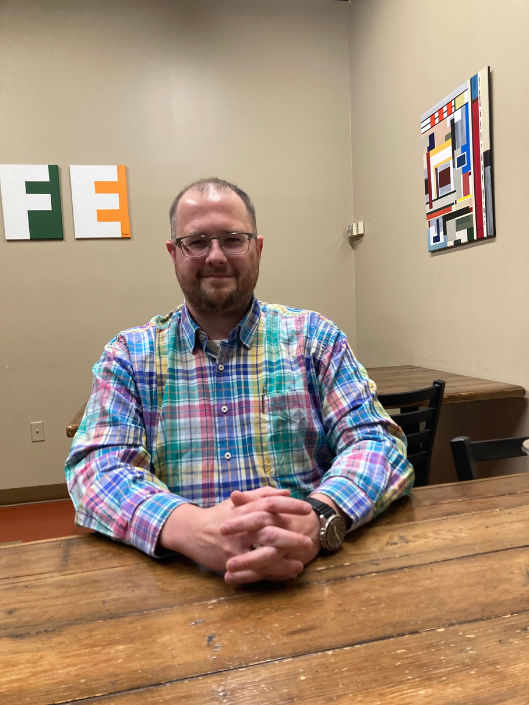
“Jeremy, go love who you want.”
Jeremy Cole, 40, is a gay man and an accountant in Tyler. He and his husband are members of St. Francis Episcopal Church. Cole grew up in Ennis, Texas. He said his Catholic community there stretched back four or five generations. As a “cradle Catholic,” Cole went through confirmation and attended mass regularly until he lost interest and began working in high school.
As an adult, Cole missed the music and message of church. He slowly returned and became very active, singing and volunteering. “My priest had me on speed dial, basically,” he said. Cole even considered becoming a Catholic priest.
Cole filled his life with church and work, all the while knowing – as early as age 5 – he was gay. In his late 20s, he reached out to gay-friendly groups in Dallas and Fort Worth. The first time he attended evening prayer, he sat with devout Christians who also were LGBTQ.
“There was a cross-dresser. There were lesbians. There were gay men,” Cole said.
A conversation with a priest named Father Warren left a lasting impact. “He brought up the primacy of conscience. He said, ‘Jeremy, go love who you want.’”
Cole often stayed late into the night with the group in Dallas. “It’s just this lovely connection of other faith based people in the LGBT community. It was amazing. Instead of just going to a club and meeting others, [I was] having a true connection with people. We share certain values,” he said.
When Cole and his husband moved to Tyler, they tried St. Francis Episcopal Church. Soon, Cole’s husband became confirmed and Cole – having already had the sacraments of the Catholic Church – was received.
“They just took us in, and we just love them. Some of the members maybe were not [explicitly affirming], but the majority of them were, and they just loved us from the beginning,” Cole said.
Growing up, Cole said he knew if he came out the response from family, classmates and church would be negative. “People always assumed I was [gay]. I had boy band posters on my wall – come on, I love Celine Dion – all the clichés.”
Recently, Cole’s co-workers at his accounting firm signaled their affirmation of him and his husband’s relationship. “They’re like, ‘Okay, you can come back, but there’s two conditions. Number one, we get John and number two, we get cupcakes’ because he’s a home baker.
“That’s saying something for a conservative accounting firm here in East Texas. And they love both of us.”

“Are you really threatened by someone who’s … trying not to get married?”
Jill Johnson is a 30-something professor of English at Tyler Junior College. She identifies as asexual, aromantic or aegosexual. From a young age, Johnson felt a strong spiritual connection.
“I was always vibing with God … I had lots of mystical experiences when I was a little girl.
“I’m a big believer in the Irish concept of thin spaces. [Growing up], we had this one bathroom in particular that I always felt like you could feel the spirit of God. I would always go in there to pray. In college, I had a friend whose laundry room felt the same way,” she said.
Later in life, she recognized another tendency – one at odds with her extended family, church leaders and social expectations.
“I really enjoy thinking about sex or reading about romance and that sort of thing, but don’t ever want to put myself in that picture,” she said.
Johnson also recognized she had little interest in partnership and marriage. “Ever since I was little, I remember telling people, ‘I’m never going to get married’ and everyone would be like, ‘Of course you will. You just haven’t met the right person yet.’ Or, ‘Oh, don’t say that.’”
Johnson eschews a traditional relationship with a partner. Instead, she embraces a solo life.
“I really love living by myself. I find a lot of satisfaction in my garden and my dog. I would hate it if someone was in my house waiting for me or always expecting me to do stuff,” Johnson said.
Meanwhile, Johnson grapples with messages about marriage from the church pulpit. “[One] pastor was saying. ‘Hey, just get married. Just pick someone, and stick with it.’ That sounds like terrible advice,” she said.
Johnson also recalled a memorable chapel at Grace Community School where she taught. It was a turning point in her affiliation with some churches. She got up and left the room when the speaker said women were like treasure buried in the ground waiting for a man to dig them up.
“So am I just an object that has no value until someone says I do?” she asked.
Johnson now co-leads Friends of St. Joan, a ministry of Christ Episcopal Church. Johnson’s aim for the group is clear. “We want someone who would say, ‘I never thought I would step foot in a church again’ to feel like they can.
“There should be a place for everyone and if someone wants to go, they should feel like they can. And I think that, especially in Tyler, that is not true.”
Johnson concedes being aromantic or asexual is a designation some congregants can accept more readily than being gay or trans. She hopes to be a voice for LGBTQ congregants.
“I am a relatively benign ambassador to the church,” she said.
“Are you really threatened by someone who’s not having sex and is trying not to get married?”
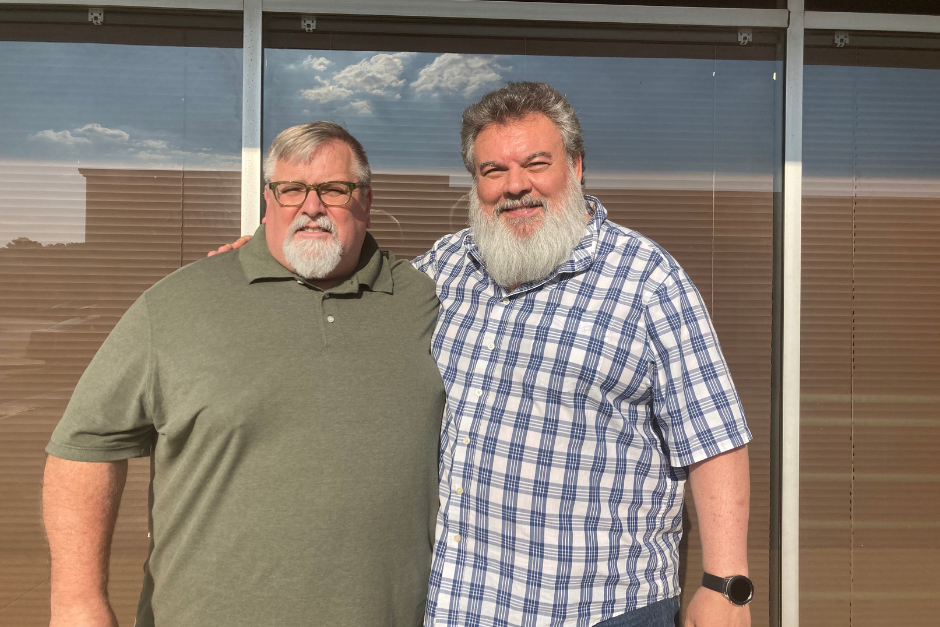
“We love you no matter what.”
John David Creamer is a 60-year-old gay man and former pastor of Life Covenant Church, a now defunct church which specifically welcomed LGBTQ people.
Creamer was raised in the Southern Baptist denomination.
“I was raised that we were supposed to be married with 2.3 kids living in a little white house with the picket fence, and everything was gonna be okay,” Creamer said.
After two marriages to women that ended in divorce, Creamer knew something had to change.
“I knew the whole time that I was gay. When I got married twice, [I] hurt two beautiful women, because that’s what society expected of me … to hide behind.”
When Creamer began to pastor a church that openly affirmed gay people, he decided it was time to come out to his parents. “I told my mom and dad by telling them what type of church it was,” he said.
His parents’ response gave Creamer strength moving forward. Creamer said, “They told me, ‘We love you no matter what, and we know that you’re a man of God just the way that you are. And it’s about time somebody steps up and teaches people that they can be loved the way that they were created.’ I was blown away.”
Creamer realized his identity as gay and Christian put him in a rare category. “If you were gay and Christian, the gays didn’t want you around, because you were Christian. And if you were Christian, the Christians didn’t want you around because you were gay,” he said.
Creamer now attends First Christian Church. He chuckled recounting a conversation with a congregant who assumed Creamer and his husband were brothers. Creamer corrected him, explaining, “We’re partners.” The congregant said, “What kind of business do you have?” assuming they were business partners.
“The majority of the people that go to the church I think are very affirming, but … you’ve got those that wish you were dead, and it’s sad for them,” Creamer said.
Creamer wishes more people would become curious about LGBTQ people.
“Just give us a chance, get to know us. If it’s something you’re afraid of or something you don’t understand, ask,” he said.
Creamer said acceptance by family and community is a life or death matter for LGBTQ children. “Understand that if you reject your child because they’re LGBT, there’s a 50% chance that they will die.
“If it’s a transgender child and you reject them, it’s even higher,” he said.
“And people are doing it left and right in the name of Jesus.”
“I’m tired of what Christianity is doing to people.”
Jerry Bailey is a gay man originally from Indiana who has made Tyler home the past 10 years. Bailey and Creamer are a married couple and both grew up in the church.
Bailey’s mother took him to a Baptist church as a child; later, he joined the Methodist Church. When he moved to East Texas, Bailey joined Life Covenant Church, where his now-husband served as pastor.
Bailey said he thought living in Tyler where people are “immersed in religion” would be a breath of fresh air. But recently, Bailey stopped attending church, mostly for political reasons. “I’m just tired of what Christianity is doing to people,” he said.
While still attending church, Bailey said he heard fellow congregants joking about trans people and Black people. He even heard congregants say gay people deserve to die.
Although he no longer attends church services, Bailey continues reading books about Christianity and spirituality to inform and deepen his faith.
“To God, it doesn’t matter who you are or what sexual preference you have or whether you aren’t the gender you were born with.
“And also, if it was such a big deal, why didn’t Jesus speak about [sexual and gender orientation] when he spoke about divorce … and all the other problems?”
Bailey would like to see East Texans talk more openly about homosexuality instead of whispering about it. “If you act ashamed of [being gay], you’re saying there’s something to be ashamed of,” he said.
By contrast, Bailey and his husband Creamer put a gay pride flag in front of their house. Bailey is pleased that most comments from neighbors and passers-by are positive.
Bailey wishes more Christians in East Texas would delve into the content of the Bible. “I wish people would study religion themselves rather than parrot what a minister says.
“If they would follow Christ … I think they would be a lot kinder to everybody else,” Bailey said.
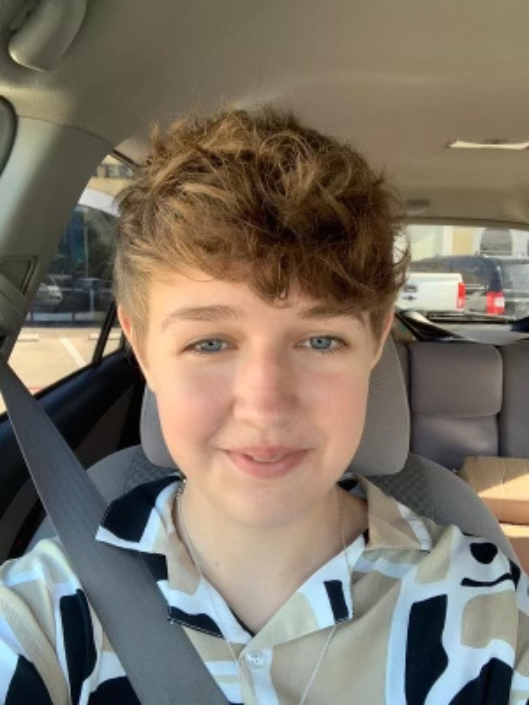
“That is yet to unfold.”
Lucky Hennigan, 13, is an androgynous, bisexual person attending The Leadership Academy in Tyler. Hennigan prefers alternating the pronouns she, he and they. Embracing a queer identity is not a novel idea for her.
“A lot of my family is queer, and that’s meant my faith has never been opposite of queerness. It’s been tied to it,” Hennigan said.
Hennigan has grown up attending an Episcopal church that accepts LGBTQ people. Over the years, however, he has become aware of church members and classmates who disapprove of people with LGBTQ identities.
“My classmate has said before that women loving other women is wrong. My grandmothers are lesbians, and so I was offended by that,” Hennigan said.
Hennigan explained some of his feelings as an androgynous person. “I want to look like a boy and pass as a boy and be very masculine, but I also want to wear skirts and dresses and look like a girl. [That’s] tough to experience, because I can’t do both of those things at the same time.”
Hennigan will start eighth grade this fall and has yet to be in a relationship that might confirm her identity further. “Since I’ve never actually dated anybody, I’m not sure if I’m gay, bisexual or lesbian. I think that it’s one of those,” they said, “but that is yet to unfold.”
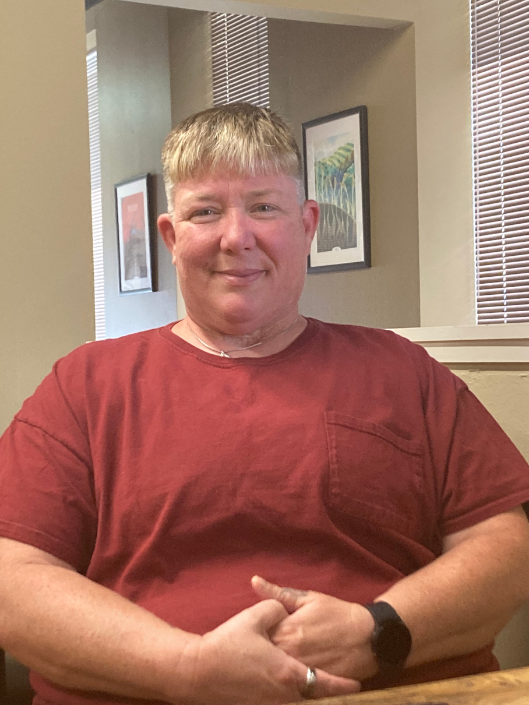
“Being something of a unicorn … has changed the minds of people.”
Shana Price grew up in Texas City and has lived in Tyler for about 20 years. Price, who drives a truck for a living, has called herself a lesbian, but more recently, she is drawn to identifying as gender queer.
“As part of our journey … we find bits of ourselves as we go along. Being true to myself, there’s more masculinity in me,” she said.
Price was introduced to church and faith through her mother, who converted to Christianity when Price was 6 years old.
Price’s mother decided to bring her children to church with her, even though Price’s stepfather strongly disapproved. The consequences for Price were enormous. “My mother obeying God is probably what changed the entire course of my life,” she said.
In the mid-80s in her youth group, Price met a girl at church. Although she didn’t have language for the attraction she felt, Price knew it was more than friendship.
Price described herself at that time as naïve and sheltered. All she knew about being gay was Gay-Related Immunodeficiency Disorder, a precursor to HIV.
While family members disapproved and threatened rejection, Price lived in turmoil, running away from home and then returning multiple times. It was her father who broke through with affirmation.
“He told me … ‘I’ve suspected all along, and you’re not the girliest girl I’ve ever seen. I’m probably not gonna get as many grandkids as I want, but I guess that’ll be [all] right,’” Price said.
More people stepped in to provide reassurance to Price at a critical time. Her mother’s best friend took her aside and told her, “Jesus doesn’t care if you’re gay. Jesus made you, and he loves you. And he’s gonna hang on to you no matter what.”
“That was a very powerful moment in my life. That grounded me,” Price said.
Later, she attended a prophetic convention with her church. On the drive there, Price said she prayed God would tell her if he still loved her.
When she arrived at the convention, a woman Price had never seen looked at her and said, “Daughter, I made you who you are. I know you, and I love you.”
Meanwhile, Price and her mother “argued relentlessly” and became estranged for more than two years. “We would see each other at Walmart and walk different directions,” Price said.
Eventually, Price said her mother decided she had lost her daughter for long enough. She told Price, “I don’t care who you love. I turn you over to God’s hands. If that’s God’s plan, whatever, I can’t say I approve, and please don’t ask me to condone.
“But know that I wanna have a relationship with you and whatever that looks like, I’m just gonna have to learn how to live with it.”
Later, Price’s mother attended her wedding and stood with her.
Price said she was pleased when the pastor of First Christian Church did not have a problem with her and her wife. She explained her posture toward church leaders and congregants who may question her identity.
“I don’t need to be tolerated; I need you to understand I am who I am. I make no apologies. I do not make excuses, because I don’t owe you that. My wife is who she is; we are who we are,” Price said.
Nowadays, Price is less intent on winning arguments and more interested in living her life. “It’s more important to just do what’s right than it is to be right,” she said.
“I have found that just living and being something of a unicorn … has changed the minds of more people in my family than anything I could have ever said to them.
“Are you gonna be an angry voice in the mob or like Christ who fed the 5,000?” she asked.
Price is dismayed at the toll rejection is taking on young LGBTQ people.
“There are too many teens … killing themselves … because of the ridicule and … outright hatred they receive from their parents and from those that are supposed to love them,” she said.
Price recalled a quote she hopes to see realized in Tyler.
“Someday we’re just gonna fall in love, and it’s not gonna be a big deal. I’m not gonna have to explain who I fell in love with or why … I’m just gonna be in love, and it’s gonna be enough.”
Love what you're seeing in our posts? Help power our local, nonprofit journalism platform — from in-depth reads, to freelance training, to COVID Stories videos, to intimate portraits of East Texans through storytelling.
Our readers have told us they want to better understand this place we all call home, from Tyler's north-south divide to our city's changing demographics. What systemic issues need attention? What are are greatest concerns and hopes? What matters most to Tylerites and East Texans?
Help us create more informed, more connected, more engaged Tyler. Help us continue providing no paywall, free access posts. Become a member today. Your $15/month contribution drives our work.







